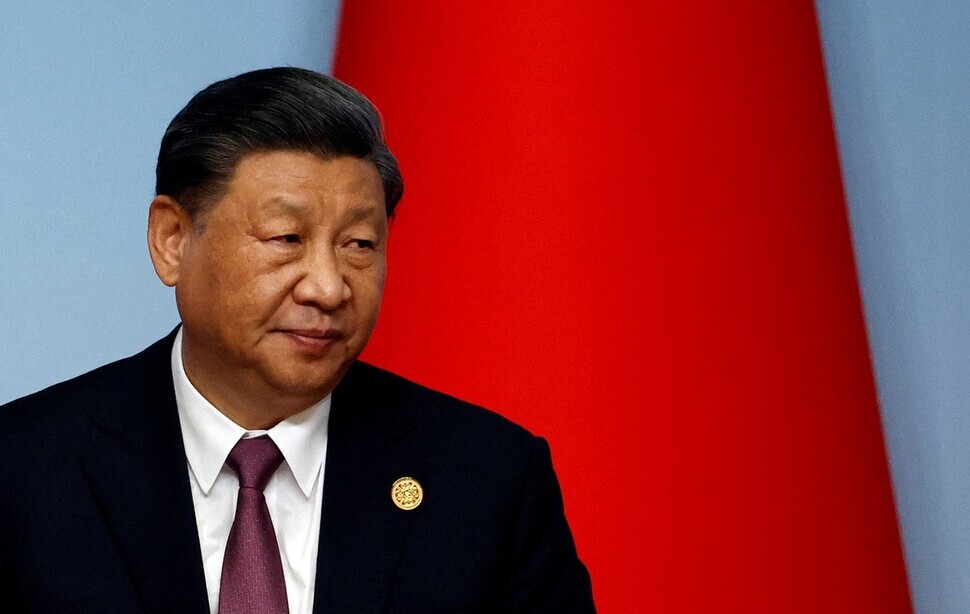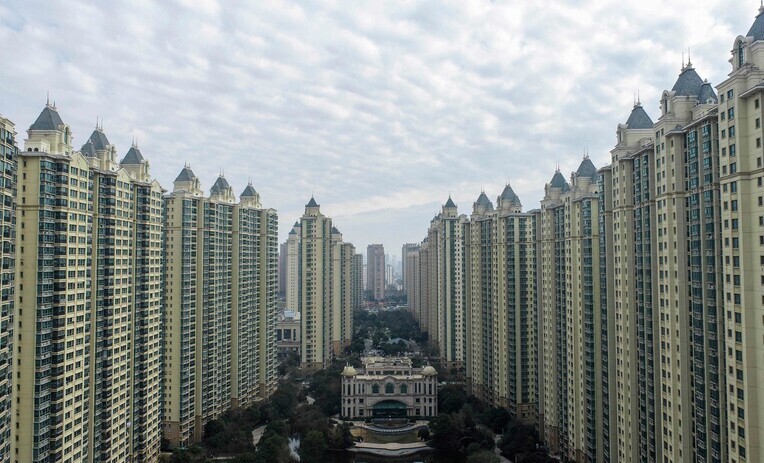hankyoreh
Links to other country sites 다른 나라 사이트 링크
A growth engine for 40 years, real estate is now China’s greatest liability

The Chinese real estate crisis triggered when developer China Evergrande Group defaulted on its debt in late 2021 is rapidly leading to defaults at other major real estate developers in the country, including Country Garden and Sino-Ocean Group.
Companies handling around 40% of China’s housing supply face a liquidity crisis as they struggle to raise millions of dollars in cash, raising fears that China’s real estate crisis could blow up at any moment. But since the crisis has followed the Chinese government’s deleveraging policy, others believe Beijing is perfectly capable of keeping things under control.
Will crisis in real estate spill over into financial sector?China’s real estate crisis was reignited after two years of relative calm when a subsidiary of the Wanda Group, a Chinese real estate developer, nearly defaulted on its debt in July. Wanda barely managed to redeem US$400 million worth of loans that had come due by selling off shares in its subsidiary.
Then in early August, Country Garden, a massive private-sector real estate developer with assets totaling 330 trillion won, failed to pay US$22.5 million on two US$1 billion bonds that had matured. Sino-Ocean Group, a state-owned real estate developer, also failed to make a US$20.94 million coupon payment.
The crisis for real estate developers may well lead to contagion in the financial sector. Zhongrong International Trust, which has invested clients’ funds in real estate, has recently been unable to keep up with payments on financial products worth 350 billion yuan (around US$48 billion).
In short, the cash crunch is impacting not only privately owned Country Garden and state-owned Sino-Ocean Group, which had been contenders, along with Evergrande, for the position of No. 1 real estate developer, but also financial firms like Zhongrong that have focused on real estate. That has prompted the Western media to raise fears about a “Lehman Brothers moment” in which real estate issues trigger a financial crisis like that in 2008.
Why is it that these companies — which have tens or even hundreds of billions of properties under management — are struggling to raise a few tens of millions in interest payments?
The Chinese real estate market was plunged into the current crisis by a series of real estate regulations imposed by the Chinese authorities in 2020 compounded, most critically, by the three-year COVID-19 pandemic.
Deeming that real estate developers were under too much debt, the Chinese government laid down three ironclad rules for developers in August 2020: their debts must not exceed 70% of their assets, their net debt ratio must not exceed 100%, and their short-term debt must not exceed their cash assets. Those rules have been throttling real estate developers, which habitually take out more debt than they’re worth.
The measures the Chinese authorities had taken to normalize the real estate market amplified the crisis in conjunction with the COVID-19 pandemic, which had begun shortly before, in January 2020.
The chain of events went as follows: COVID-19 lockdowns precipitated an economic recession, which caused real demand to decrease and real estate prices to fall, while developers racked up unsold housing units.
Housing prices plummeted in major Chinese cities like Beijing and Shanghai. Developers’ backlog of unsold housing continues to pile up — all told, it’s estimated there are millions, or even tens of millions, of such units.
Real estate developers that had indulged in lax management while taking out huge loans soon found themselves in a cash crunch.
Last year, construction firms that were running short on cash fell behind on their building schedules, which prompted the people who had bought houses in advance to stop making mortgage payments.

The Chinese real estate market has driven economic growth in China for nearly four decades now since the country carried out its reform and opening campaign in the 1980s.
Big building projects — not only housing, but also airports, bridges, harbors and railroads — have produced oodles of jobs and coincided with a boom in the electronics and furniture industries. Local governments were also able to prop up their budgets with revenue from land sales.
Housing prices soared through the early 2010s as the Chinese economy galloped along at a growth rate of 10% or above. Homeowners were rewarded as their property ballooned in value. Housing prices in top-tier cities such as Beijing, Shanghai and Shenzhen skyrocketed to levels comparable to Seoul, New York and Tokyo.
But in the 2010s, the overheated real estate market and soaring property prices produced a severe divide between the rich and poor. Housing prices were so high that young people began to avoid having children or even getting married.
Another problem was that money in the market kept pouring into the real estate market, rather than key industries or the high-tech sector. In short, real estate had devolved from a driver of growth into an obstacle to growth.
In 2015, the Chinese authorities began imposing controls on the real estate sector under the slogan, “Houses are for living in, not for speculating.” The goal was to maintain stable growth while preventing extreme fluctuations in real estate prices.
While the Chinese authorities have acknowledged the real estate crisis to some extent, there are no signs of Beijing adopting the radical measures of the past. When the People's Bank of China, China’s central bank, adjusted interest rates on Aug. 21, it didn’t touch the five-year loan prime rate (the base rate for mortgage loans), contrary to market expectations.
That basically confirms that the Chinese government is being much more prudent than foreign observers had assumed.
“The real estate market is currently in a restructuring phase. Some real estate developers are facing difficulties, and large developers are particularly exposed to debt risks” said Fu Linghui, a spokesperson for China’s National Bureau of Statistics, on Aug. 15.
This suggests that the Chinese government believes the difficulties in the real estate market amount to a time of realignment that could provide an opportunity to normalize the market.
But the Western outlook remains pessimistic. Some analysts even see the real estate crisis as signifying the failure of the Chinese model of growth that has gotten such astounding results for more than four decades.
That was the position taken by a Wall Street Journal article on Aug. 20, titled “China’s 40-year boom is over.” According to the newspaper, the Chinese economic model that “took the country from poverty to great-power status” is now “broken.”
“Everywhere are signs of distress,” the paper said. “Parts of China are saddled with under-used bridges and airports. Millions of apartments are unoccupied. Returns on investment have sharply declined.”
By Choi Hyun-june, Beijing correspondent
Please direct questions or comments to [english@hani.co.kr]

Editorial・opinion
![[Column] The state is back — but is it in business? [Column] The state is back — but is it in business?](https://flexible.img.hani.co.kr/flexible/normal/500/300/imgdb/original/2024/0506/8217149564092725.jpg) [Column] The state is back — but is it in business?
[Column] The state is back — but is it in business?![[Column] Life on our Trisolaris [Column] Life on our Trisolaris](https://flexible.img.hani.co.kr/flexible/normal/500/300/imgdb/original/2024/0505/4817148682278544.jpg) [Column] Life on our Trisolaris
[Column] Life on our Trisolaris- [Editorial] Penalties for airing allegations against Korea’s first lady endanger free press
- [Editorial] Yoon must halt procurement of SM-3 interceptor missiles
- [Guest essay] Maybe Korea’s rapid population decline is an opportunity, not a crisis
- [Column] Can Yoon steer diplomacy with Russia, China back on track?
- [Column] Season 2 of special prosecutor probe may be coming to Korea soon
- [Column] Park Geun-hye déjà vu in Yoon Suk-yeol
- [Editorial] New weight of N. Korea’s nuclear threats makes dialogue all the more urgent
- [Guest essay] The real reason Korea’s new right wants to dub Rhee a founding father
Most viewed articles
- 1[Column] Why Korea’s hard right is fated to lose
- 2[Column] The state is back — but is it in business?
- 360% of young Koreans see no need to have kids after marriage
- 4Amid US-China clash, Korea must remember its failures in the 19th century, advises scholar
- 5Japan says it’s not pressuring Naver to sell Line, but Korean insiders say otherwise
- 6[Reporter’s notebook] In Min’s world, she’s the artist — and NewJeans is her art
- 7AI is catching up with humans at a ‘shocking’ rate
- 8S. Korean chaebols comprise 84% of GDP but only 10% of jobs
- 9[Column] Life on our Trisolaris
- 10[Reportage] New funeral culture taking hold in South Korea